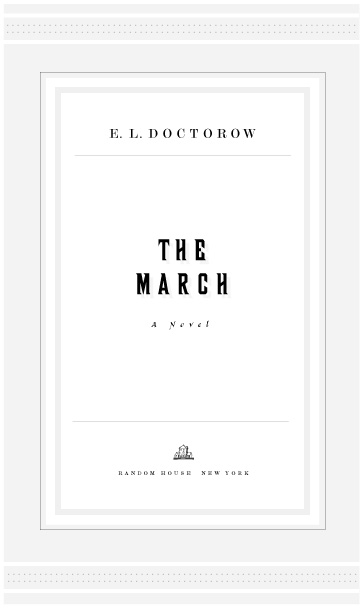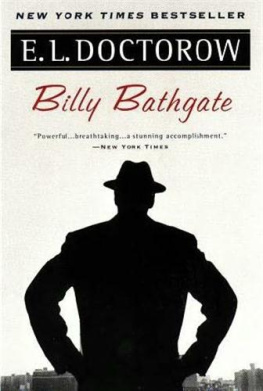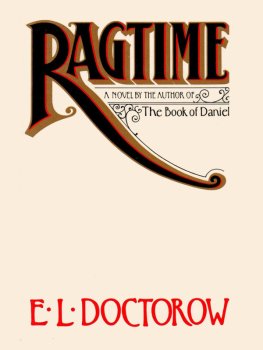E. L. Doctorow - The March
Here you can read online E. L. Doctorow - The March full text of the book (entire story) in english for free. Download pdf and epub, get meaning, cover and reviews about this ebook. year: 2005, publisher: Random House, genre: Detective and thriller. Description of the work, (preface) as well as reviews are available. Best literature library LitArk.com created for fans of good reading and offers a wide selection of genres:
Romance novel
Science fiction
Adventure
Detective
Science
History
Home and family
Prose
Art
Politics
Computer
Non-fiction
Religion
Business
Children
Humor
Choose a favorite category and find really read worthwhile books. Enjoy immersion in the world of imagination, feel the emotions of the characters or learn something new for yourself, make an fascinating discovery.

- Book:The March
- Author:
- Publisher:Random House
- Genre:
- Year:2005
- Rating:3 / 5
- Favourites:Add to favourites
- Your mark:
- 60
- 1
- 2
- 3
- 4
- 5
The March: summary, description and annotation
We offer to read an annotation, description, summary or preface (depends on what the author of the book "The March" wrote himself). If you haven't found the necessary information about the book — write in the comments, we will try to find it.
The March — read online for free the complete book (whole text) full work
Below is the text of the book, divided by pages. System saving the place of the last page read, allows you to conveniently read the book "The March" online for free, without having to search again every time where you left off. Put a bookmark, and you can go to the page where you finished reading at any time.
Font size:
Interval:
Bookmark:


CONTENTS
HELEN

I
A T FIVE IN THE MORNING SOMEONE BANGING ON THE door and shouting, her husband, John, leaping out of bed, grabbing his rifle, and Roscoe at the same time roused from the backhouse, his bare feet pounding: Mattie hurriedly pulled on her robe, her mind prepared for the alarm of war, but the heart stricken that it would finally have come, and down the stairs she flew to see through the open door in the lamplight, at the steps of the portico, the two horses, steam rising from their flanks, their heads lifting, their eyes wild, the driver a young darkie with rounded shoulders, showing stolid patience even in this, and the woman standing in her carriage no one but her aunt Letitia Pettibone of McDonough, her elderly face drawn in anguish, her hair a straggled mess, this woman of such fine grooming, this dowager who practically ruled the season in Atlanta standing up in the equipage like some hag of doom, which indeed she would prove to be. The carriage was piled with luggage and tied bundles, and as she stood some silver fell to the ground, knives and forks and a silver candelabra, catching in the clatter the few gleams of light from the torch that Roscoe held. Mattie, still tying her robe, ran down the steps thinking stupidly, as she later reflected, only of the embarrassment to this woman, whom to tell the truth she had respected more than loved, and picking up and pressing back upon her the heavy silver, as if this was not something Roscoe should be doing, nor her husband, John Jameson, neither.
Letitia would not come down from her carriage, there was no time, she said. She was a badly frightened woman with no concern for her horses, as John saw and quickly ordered buckets to be brought around, as the woman cried, Get out, get out, take what you can and leave, and seemed to be roused to anger as they only stood listening, with some of the field hands appearing now around the side of the house with the first light, as if drawn into existence by it. And I know him! she cried. He has dined in my home. He has lived among us. He burns where he has ridden to lunch, he fires the city in whose clubs he once gave toasts, oh yes, someone of the educated class, or so we thought, though I never was impressed! No, I was never impressed, he was too spidery, too weak in his conversation, and badly composed in his dress, careless of his appearance, but for all that I thought quite civilized in having so little gift to dissemble or pretend what he did not feel. And what a bitter gall is in my throat for what I believed was a domesticated man with a clear love for wife and children, who is no more than a savage with not a drop of mercy in his cold heart.
It was difficult to get the information from her, she ranted so. John did not try to, he began giving orders and ran back in the house. It was she, Mattie, who listened. Her aunts hysteria, formulated oddly in terms of the drawing room, moved her to her own urgent attention. She had for the moment even forgotten her boys upstairs.
They are coming, Mattie, they are marching. It is an army of wild dogs led by this apostate, this hideous wretch, this devil who will drink your tea and bow before he takes everything from you.
And now, her message delivered, her aunt slumped back in her seat, and gave her order to be off. Where Letitia Pettibone was going Mattie could not get the answer. Nor how much time there was, in fact, before the scourge arrived at her own door. Not that she doubted the woman. She looked into the sky slowly lightening to its gray beginnings of the day. She heard nothing but the cock crowing and, as she turned, suddenly angry, the whisperings of the slaves gathered now at the corner of the house. And then with the team away, the carriage rolling down the gravel path, Mattie turned, lifting the hem of her robe, and mounted the steps only to see that horrible child Pearl, insolent as ever, standing, arms folded, against the pillar as if the plantation was her own.
JOHN JAMESON was not unprepared. As far back as September, when the news had come that Hood had pulled out and the Union armies had Atlanta, he sat Mattie down and told her what had to be done. The rugs were rolled, the art was taken down from the walls, her needlepoint chairswhatever she valued, he told herher English fabrics, the china, even her family Bible: it was all to be packed up and carted to Milledgeville and thence put on the train to Savannah, where Johns cotton broker had agreed to store their things in his warehouse. Not my piano, shed said, that will stay. It would rot in the dampness of that place. As you wish, John had said, having no feeling for music in any case.
Mattie was dismayed to see her home so depleted. Through the bare windows the sun shone, lighting up the floors as if her life were going backward and she was again a young bride in a new-built unfurnished manse and with a somewhat frightening husband twice her age. She wondered how John knew the war would touch them directly. In fact he didnt, but he was a man whose success gave him reason to suppose he was smarter than most people. He had a presence, with his voluminous chest and large head of wild white hair. Dont argue with me, Mattie. They lost twenty or thirty thousand men taking that city. Theres hell to pay. Youre a general, with a President whos a madman. Would you just sit there? So where? To Augusta? To Macon? And how will he ride, if not through these hills? And dont expect that poor excuse for a Rebel army to do anything about it. But if Im wrong, and I pray God I am, what will I have lost, tell me?
Mattie was not allowed to disagree in such matters. She felt even more dismayed and said not a thing when, with the crops in, John arranged to sell away his dozen prime field hands. They were bound, all of them, to a dealer in Columbia, South Carolina. When the day came and they were put in shackles into the wagon, she had to run upstairs and cover her ears so as not to hear the families wailing down in the shacks. All John had said was No buck nigger of mine will wear a Federal uniform, Ill promise you that.
But for all his warning and preparation she could not believe the moment had come to leave Fieldstone. The fear made her legs weak. She could not imagine how to live except in her own home, with her own things, and the Georgian world arranged to provide her and her family what their station demanded. And though Aunt Letitia was gone, she had infected them with her panic. For all his foresight, John was running around this way and that, red-faced, shouting and giving orders. The boys, roused out of bed and still only half dressed, came down the stairs with their rifles and ran out through the back.
Mattie went to her bedroom and stood not knowing where to start. She heard herself whimpering. Somehow she dressed and grabbed whatever she could from her armoire and bath and threw everything into two portmanteaus. She heard a gunshot and, looking out the back window, saw one of the mules go down on its knees. Roscoe was leading another from the stable, while her older boy, John Junior, primed his rifle. It seemed only minutes later, with the sun barely on the treetops, that the carriages were waiting out front. Where were they to seat themselves? Both carriages were loaded with luggage and food hampers and sacks of sugar and flour. And now the morning breeze brought the smoke around from the stacks where John had set the fodder alight. And Mattie felt it was her own sooty life drifting away in the sky.
Next pageFont size:
Interval:
Bookmark:
Similar books «The March»
Look at similar books to The March. We have selected literature similar in name and meaning in the hope of providing readers with more options to find new, interesting, not yet read works.
Discussion, reviews of the book The March and just readers' own opinions. Leave your comments, write what you think about the work, its meaning or the main characters. Specify what exactly you liked and what you didn't like, and why you think so.







